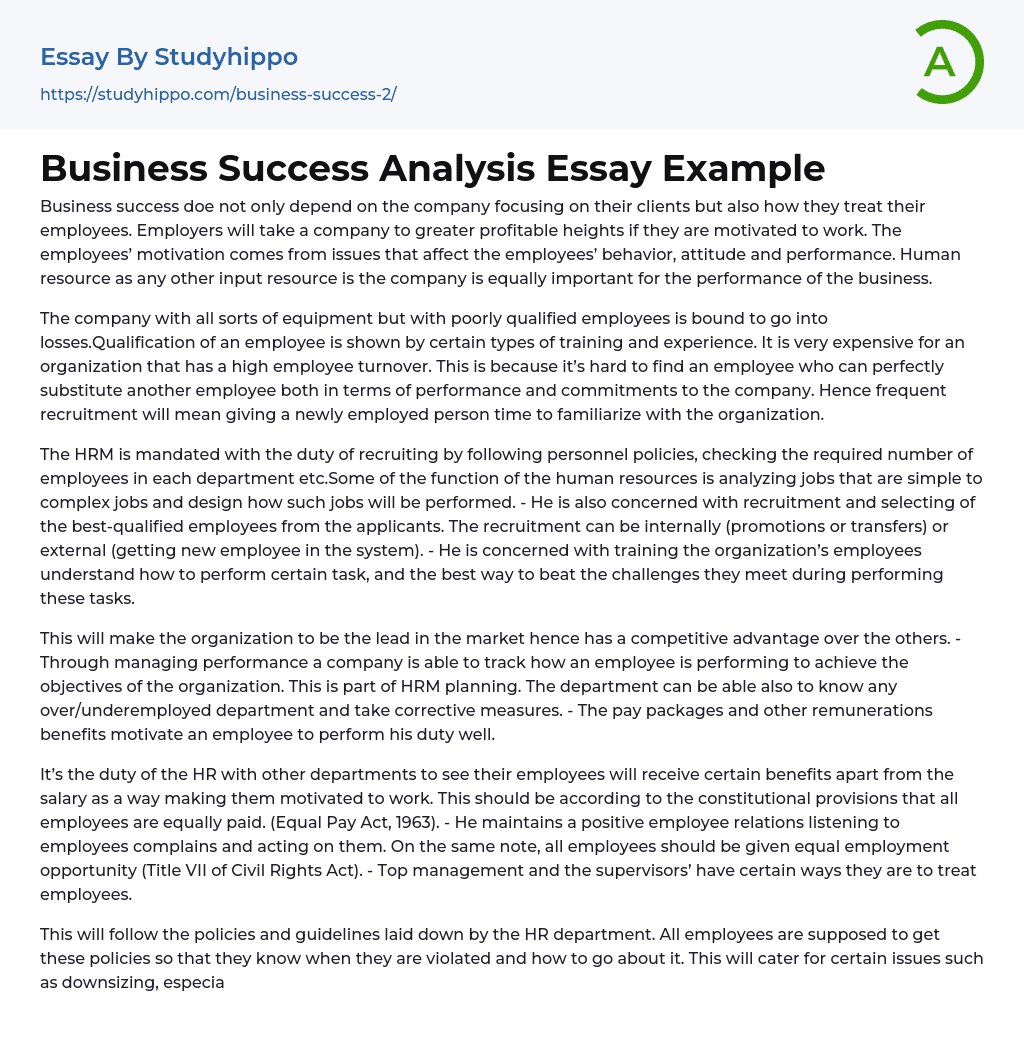It's not just customer satisfaction that determines a company's success, but also employee treatment. Motivated employees can lead a company towards greater profitability. Factors such as behavior, attitude, and performance affect their level of motivation. Human resources, like any other resource, is crucial to a company's overall performance.
If a company has inadequate staff qualifications, despite having different kinds of equipment, it is likely to suffer financial losses. The competence of employees is demonstrated through their experience and completion of specific training. High staff turnover rates can be costly for an organization. This is due to the challenge of finding an employee who can skillfully replace their predecessor, while also being committed to the company. As a result, frequent recruitment may require granting new employees an adjustment period to become familiar with the organization.
The role of the HRM includes recruitment, whi
...ch involves adhering to personnel policies and determining the necessary number of employees for each department. Additionally, they analyze and design job duties for positions ranging from simple to complex. Selection of the most qualified candidates for hiring is also a responsibility of HR, whether through internal promotions or external recruitment. They also oversee employee training to ensure proficiency in task execution and identify strategies to overcome challenges that arise during job performance.
By managing performance, an organization can become the market leader and have a competitive advantage over others. Performance management allows companies to track employee progress towards achieving organizational objectives, which is integral to HRM planning. The department can also identify any over/underemployed areas and take corrective actions. Additionally, competitive pay packages and remuneration benefits motivate employees to perform to their best
abilities.
The HR department, in conjunction with other departments, is accountable for providing employees with incentives beyond their wages to encourage productivity. These benefits must adhere to the Equal Pay Act of 1963's requirement that all workers receive equal compensation. Furthermore, maintaining favorable employee relationships and addressing any grievances (Title VII of the Civil Rights Act) are crucial. Finally, top management and supervisors have a set of standards for treating employees equitably.
The HR department has created regulations and standards for employees to adhere to. These guidelines aid employees in recognizing violations and selecting the appropriate course of action. Furthermore, it is the duty of the HR department to ensure that higher management follows personnel-related laws such as the Vocational Rehabilitation Act of 1973. Cooperation between human resources and the HR department is crucial in achieving success in organizational strategy.
The significance of HR lies in their responsibility for strategizing workforce planning to accomplish organizational objectives by evaluating employee strengths and weaknesses. Efficient management of HR necessitates the possession of specific abilities, including human interaction skills that facilitate communication, negotiation, and team building. Moreover, decision-making proficiencies are vital as decisions can affect several departments and have social consequences. Hence, HR managers need to comprehend the implications of their decisions and how to manage them effectively. As employees drive most organizational transformations, leadership is a key attribute that HR managers must exhibit to attain goals and overcome obstacles.
The competencies and skills of HR are crucial in comprehending all aspects concerning their domain and any ensuing alterations. This will enable them to efficiently execute their responsibilities. The supervisors, being the intermediaries between employees and management, play a crucial role
in ensuring that both employee needs and organizational objectives are met. Consequently, they should be endowed with specific powers to discharge their duties.
HRM Ethics is concerned with what is considered right or wrong by both the organization and its employees. This encompasses the rights of employees such as free consent, privacy, freedom of conscience, speech, and due process.
The HRM must adhere to certain guidelines to maintain ethical standards. These include ensuring that the HR practices prioritize the greatest good for the majority of individuals, respecting employees' rights, and treating all employees and customers equally.
- Performance essays
- Human Resources essays
- Recruitment essays
- Code of Ethics essays
- Organizational Behavior essays
- Dress Code essays
- Safety essays
- Conflict essays
- Qualities essays
- American Dream essays
- Barriers To Entry essays
- Capitalism essays
- Central Bank essays
- Compensation essays
- Consumerism essays
- Economic Development essays
- Economic Growth essays
- Economic Inequality essays
- Economic System essays
- Economy essays
- Employment essays
- Export essays
- Finance essays
- Free Trade essays
- Gross Domestic Product essays
- Human Development essays
- Income Inequality essays
- Industry essays
- Inflation essays
- International Business essays
- International Trade essays
- Macroeconomics essays
- Materialism essays
- Max Weber essays
- Microeconomics essays
- Minimum Wage essays
- Monetary Policy essays
- Monopoly essays
- Pricing essays
- Profit essays
- Recession essays
- resources essays
- Taxation essays
- Trade essays
- Unemployment essays
- Warehouse essays
- World economy essays
- Accounting essays
- Andrew Carnegie essays
- Automation essays




